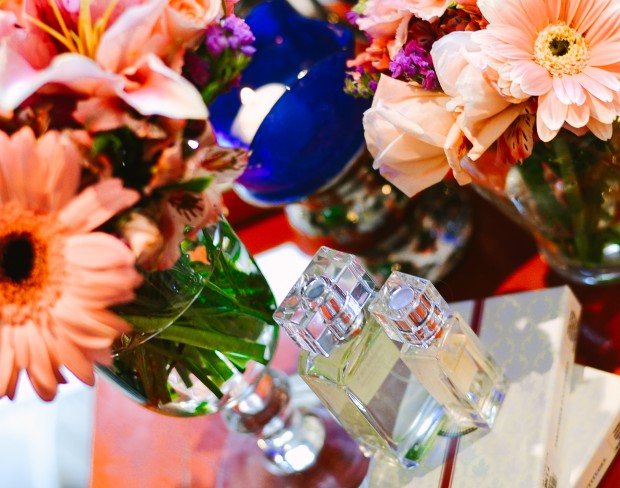I’ve read somewhere, in the many listicles that have been floating about the Internet, that you need to figure out your signature scent by the time you’re 30. But life is just too short to be associated with that certain scent. Outfits and occasions are all too diverse to just keep grabbing the same bottle day in and day out. Plus, you can also match your scent with your style.
Still, there is a formula to finding the right perfumes (yes, plural) for you. There are some fragrances that will fit you perfectly, while some will just be a little off. But between the sniffing and the spritzing, it can get a little dizzying. I then found a quick solution to figuring it all out when I sat down with Valerie D’ Andre, founder of French perfume house Heloise De V.
Growing up in the farms where her family concocts perfumes infused with fig, rose, and lavender, Valerie’s life has always revolved around the world of fragrances. “My family never sold the farms they’ve had for over 100 years. As a child, I grew up being asked to memorize and recognize scents.”
Having this background, Valerie emphasizes on the art of perfumery—and it’s not just about spritzing on a scent as you walk out the door or whenever you remember. “[The art of perfumery] entails different ways you can apply your scent or make it last at different moments [of the day] and at different intensities,” she explains. “It’s a lifestyle to always smell good and to be able to bring your scent wherever you go.” The art of perfumery follows from the tradition of how women in Paris often brought flowers with them wherever they went since their surroundings often didn’t smell that pleasant.
To be able to venture into this lifestyle and incorporate the art into your days, Valerie offers up these five tips.
#1 Dive into your olfactory memory
We unconsciously choose fragrances that remind us of our best memories. It is possible, however, to focus on these memories at will so you can narrow down your choices the next time you buy a perfume. “Olfactory memory makes up 80 percent of the reason why we like certain fragrances,” says Valerie.
So how do we retrieve olfactory memories and trace the scents we love? “[First,] recall the area or region you’re from. Second, you should think of the kind of meals you had as a child because the ingredients you cooked in your home have a great impact on you. Third, you should think about the people you share these memories with. It can be a friend or your grandmother. It can also even be someone you only met once but his/her fragrance or smell lingers in your memory,” says Valerie, “So when you smell something similar, you already love it.”
#2 Take cues from your skin tone
Once you’ve tapped into the scents that attract you, learn how to match them correctly with your skin tone. If you’ve ever wondered why some scents linger longer on your skin more than others, it’s because our skin tone, or the amount of melanin in our epidermis, affects the way we absorb the fragrances.
“For pink undertones, you can go use the floral, delicate scents like rose and lavender. Stronger fragrances would be too overpowering. You’d like your scent to stay within your personal space, not to be something that [enters the room] before you do,” shares Valerie. “For darker undertones, [you can go for] muskier fragrances with woody hints or rich, fruity essences.”
#3 A perfume is a potion
Valerie believes that all the talk about base tones and sub-tones in fragrances is a commercial ploy. “As a perfume creator, it doesn’t make sense that a fragrance is a combination of two or three distinct parts. A fragrance is like a potion where all the essences you combine act as one entity. Even the amount of essences combined can greatly change one scent.” She then warns us against combining perfumes or opting to make our own perfumes. “Unless you can get a hold of pure essences, you shouldn’t mix your own perfumes nor should you believe in how certain base tones are better than other to make the scent last longer.”
#4 Learn when to let go
It may be tempting to collect perfumes, but Valerie warns us that scents shouldn’t be stored for too long. “I wouldn’t use a perfume that I’ve had for more than three years,” Valerie advises. “A lot can change in that time and it usually affects the scent. A lot of perfumes also lose much of their essences three years after you first opened them. This is especially true when the scent is made of natural, organic ingredients.”
#5 Know the different fragrance gestures
So-called “fragrance gestures” are pro-tips for applying your perfume correctly and preserve their scent longer. You may already be familiar with a few of these gestures such as spraying the air and entering the “curtain,” using soaps and creams of the same fragrance (also known as “layering”), and spraying your pulse points such as your inner wrist, temples, and behind your ears, but Valerie lets us in on the other gestures you can do.
“[You can spray a bit of your perfume] on your jewelry. Perfumes cling well to ceramic or leather jewelry, so if you want to remind of your scent since you tend to get used to it after a time or if your need a pick-me-up. You can also get some diffusion paper, spray your chosen fragrance on it and put the paper in your bag or pocket.”
She spills another helpful secret. “If you don’t want your perfume to be too overbearing, you can spray it on your scarf and in your hair. This will diffuse your scent when the wind blows, enough for other people to be attracted to your scent.”A very faint hint of your perfume will leave a very lasting impression, after all.
Photo by Acushla Obusan

